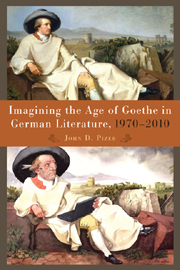Book contents
- Frontmatter
- Contents
- Acknowledgments
- Introduction
- 1 Staging Violence and Transcendence, Embracing Feminism: The Instantiation of Kleist and German Romanticism
- 2 Hölderlins East and West
- 3 Between Feminism and National Identity: The Historical Novels of Renate Feyl
- 4 Goethe Contra and Pro
- 5 Savaging and Salvaging the German Enlightenment
- Conclusion
- Bibliography
- Index
2 - Hölderlins East and West
Published online by Cambridge University Press: 05 February 2013
- Frontmatter
- Contents
- Acknowledgments
- Introduction
- 1 Staging Violence and Transcendence, Embracing Feminism: The Instantiation of Kleist and German Romanticism
- 2 Hölderlins East and West
- 3 Between Feminism and National Identity: The Historical Novels of Renate Feyl
- 4 Goethe Contra and Pro
- 5 Savaging and Salvaging the German Enlightenment
- Conclusion
- Bibliography
- Index
Summary
In a brief essay examining the rediscovery of German Romanticism in the German Democratic Republic, published shortly after the dissolution of that nation, Sonja Hilzinger concisely describes the circumstances inspiring this rediscovery and the sort of imaginative and critical writing to which it gave rise. She opens with a long quotation from a 1982 interview in which Christa Wolf describes the origins of Kein Ort. Nirgends, noting the centrality of the expulsion of Wolf Biermann in polarizing the GDR's intellectual elite. Hilzinger's choice of Wolf's voice as the vehicle for commencing her essay is appropriate, as Kein Ort. Nirgends continues to be the most canonic work to emerge from the brief flowering, in the wake of the Biermann affair, of GDR literature that imaginatively brought to life leading figures of Romanticism. Hilzinger argues that East German writers took recourse to the earlier generation of poets because of the Romantics' conflict with Classicist aesthetic norms in a conservative restoration society, which produced an existential crisis stemming from the feeling of being trapped — much like their GDR counterparts were — in a political dead end. Both the German Romantics and East German authors thus felt forced into the kind of exclusive recourse to literature that Wolf describes in the interview. For Hilzinger, the GDR engagement with German Romanticism manifested a desire to escape the desultory reality that confronted that nation's cultural elite with a sense of political impotence; at the same time, it also provided that elite with a means to protest the reactionary ambience instilled by Honecker and his allies in the GDR leadership following Biermann's expulsion.
- Type
- Chapter
- Information
- Publisher: Boydell & BrewerPrint publication year: 2011



